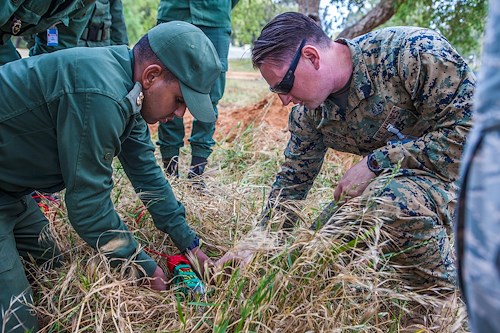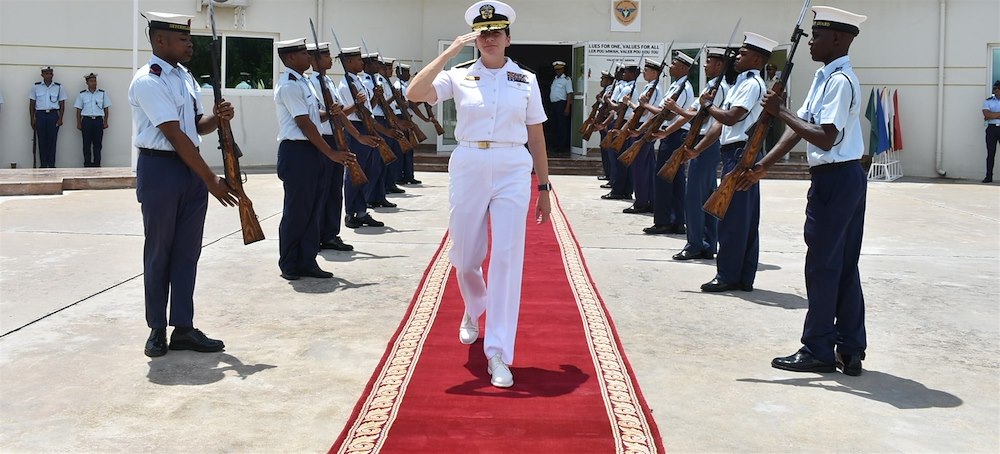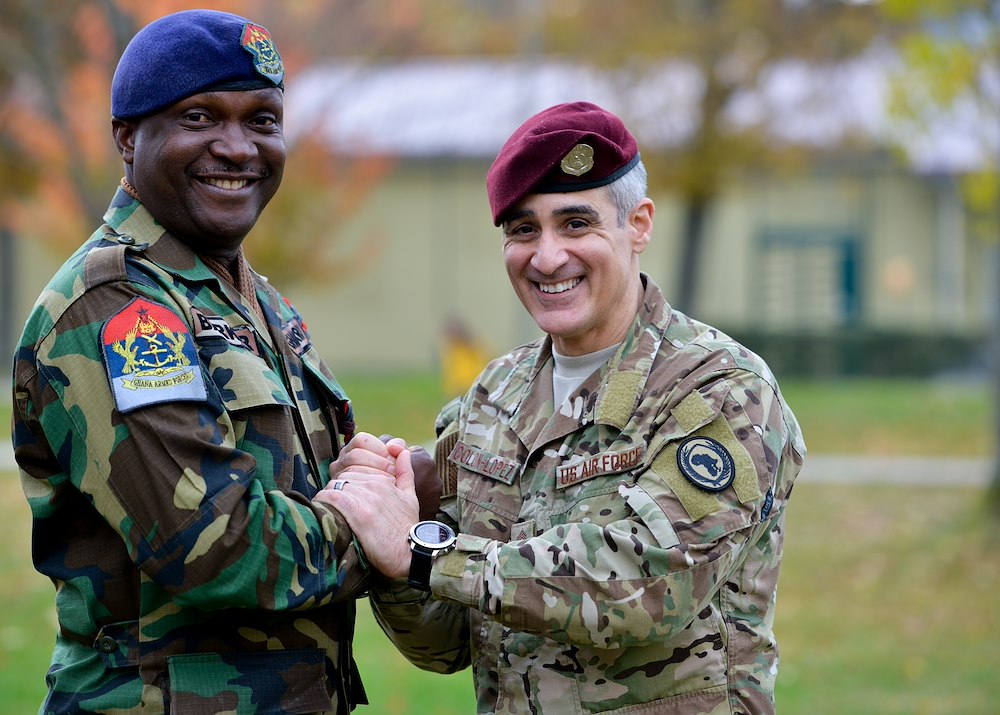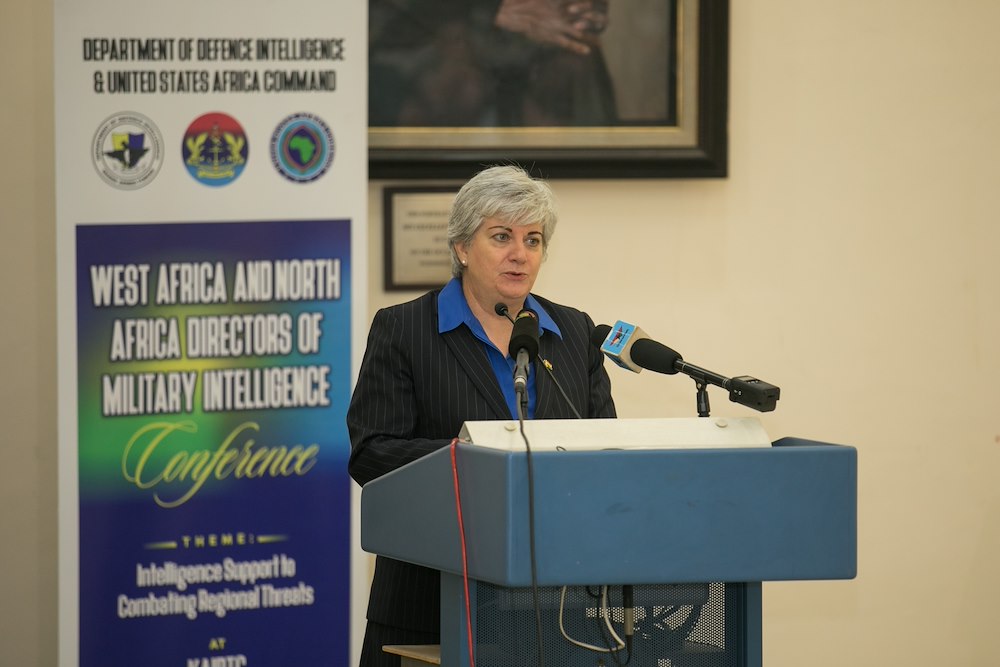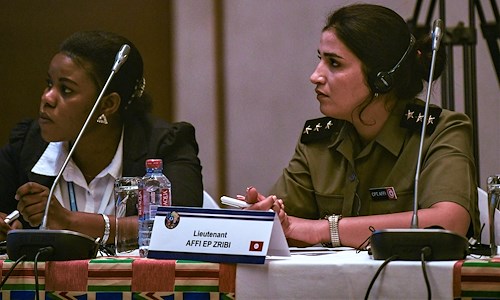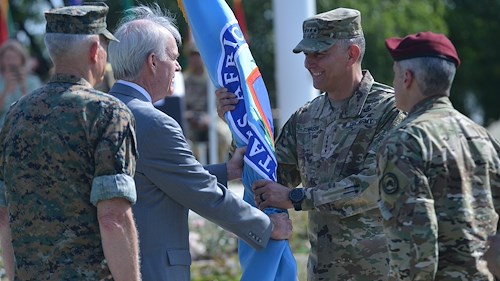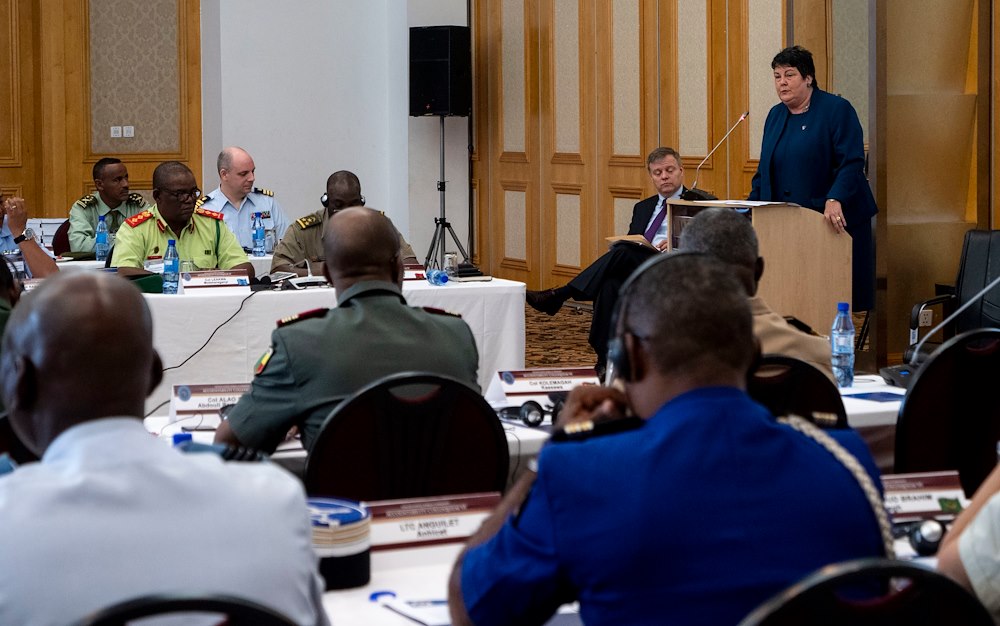Gallery contains 26 images
×
Photo 1 of 26
Humanitarian Mine Action builds demining capacity in Morocco
A U.S. Marine with Special Purpose Marine Air-Ground Task Force-Crisis Response-Africa 19.2, Marine Forces Europe and Africa, discusses detonating cord emplacement procedures with a member of the Moroccan Royal Armed Forces during Humanitarian Mine Action training at Unite de Secours et Sauvetage’s Base, Kenitra, Morocco, April 22, 2019. The Moroccan soldiers trained alongside the U.S. Marines in order to identify and properly dispose of explosive ordnance. SPMAGTF-CR-AF is deployed to conduct crisis-response and theater-security operations in Africa and promote regional stability by conducting military-military training exercises throughout Europe and Africa. (U.S. Marine Corps photo by Capt. Clay Groover)
Photo by: Capt. Clayton Groover
Photo 2 of 26
U.S. conducts joint knowledge exchange with partners in Somalia
U.S. service members in Somalia conducted a joint Tactical Casualty Combat Care knowledge exchange and mass casualty exercise with neighboring Ugandan African Union Mission in Somalia soldiers October 31, 2019. The operation enhanced partner force interoperability and communication and instilled enduring procedures for mass casualty events in the region.
Photo by: Airman 1st Class Brennen Lege
Photo 3 of 26
Exercise Cutlass Express 2019.2 Concludes
Maritime forces from 17 East African, European, North American, and West Indian Ocean nations joined several international organizations in celebrating the successful conclusion of multinational maritime exercise Cutlass Express 2019.2 (CE 19.2) during a ceremony held in Victoria, Seychelles, Nov. 16, 2019
Photo 4 of 26
AFRICOM Command Senior Enlisted Leader relinquishes responsibility
U.S. Air Force Chief Master Sgt. Ramon Colon-Lopez, outgoing command senior enlisted leader, U.S. Africa Command, poses for a photo with Chief Warrant Officer Ramous Barker, forces sergeant major of the Ghana Armed Forces following a relinquishment of responsibility ceremony Nov. 15, 2019 in Stuttgart, Germany.
Photo 5 of 26
ISR Ops Begin at Nigerien Air Base 201 in Agadez
U.S. Air Force RED HORSE take advantage of the cooler temperatures at night to pave an access ramp to the flight line at Air Base 201 in Agadez, Niger, June 28, 2019. The flight line construction is the largest U.S. Air Force-led construction project in recent history and will expand the Air Force’s ability to bring air power to western Africa. (U.S. Air Force photo by Tech. Sgt. Perry Aston)
Photo by: Tech. Sgt. Perry Aston
Photo 6 of 26
ISR Ops Begin at Nigerien Air Base 201 in Agadez
U.S. Air Force Tech. Sgt. Daniel Peterson, 724th Expeditionary Air Base Squadron air terminal operations center non-commissioned officer in charge, marshals a C-130J Super Hercules at Nigerien Air Base 201, Agadez, Niger, Aug. 3, 2019. This was the first C-130 to take-off at Air Base 201, marking the beginning of limited Visual Flight Rules operations at the base. (U.S. Air Force photo by Staff Sgt. Devin Boyer)
Photo by: Staff Sgt. Devin Boyer
Photo 7 of 26
First Time Operation Junction Rain Conducted in West Indian Ocean
Seychelles Coast Guardsmen simulate boarding a vessel during a subject matter expert exchange with the U.S. Coast Guard as part of Africa Maritime Law Enforcement Program while in Victoria, Seychelles, Sept. 24, 2019. AMPLEP is a U.S. Naval Forces Africa-facilitated initiative that aims to enhance the maritime law enforcement capabilities of African partners in order to improve management and security of the maritime domain.
Photo by: Lt. Augustus Manzi
Photo 8 of 26
U.S Africa Command and the Ghana Armed Forces host 2019 North and West Africa Directors of Military Intelligence Conference
U.S. Ambassador to Ghana, Stephanie S. Sullivan speaks during the opening ceremony of the North and West Africa Directors of Military Intelligence Conference held on September 18, 2019 at the Kofi Annan International Peacekeeping Training Center. (Courtesy photo by Courage Ahiati)
Photo 9 of 26
U.S Africa Command and the Ghana Armed Forces host 2019 North and West Africa Directors of Military Intelligence Conference
Opening Ceremony of the North and West Africa Directors of Military Intelligence Conference held on September 18, 2019 at the Kofi Annan International Peacekeeping Training Center. (Courtesy photo by Courage Ahiati)
Photo 10 of 26
AFRICOM Commander Visits West Africa
U.S. Army Gen. Stephen Townsend meets with Burkina Faso President Roch Marc Christian Kaboré Sept. 17, 2019 during a visit to Burkina Faso.
Photo 11 of 26
AFRICOM Commander Visits West Africa
U.S. Army Gen. Stephen Townsend, commander, U.S. Africa Command, reviews Burkinabe troops during a visit to Burkina Faso Sept. 17, 2019.
Photo 12 of 26
US Air Forces Africa builds partnerships through APF Kenya
U.S. Air Force Tech. Sgt. Jared Todd, 818th Mobility Support Advisory Squadron Survival, Evasion, Resistance and Escape air advisor, and Tanzania Air Force Command Col. Ian Haule, an aircraft maintenance engineer, discuss radio communication techniques at the African Partnership Flight Kenya 2019, Laikipia Air Base, Kenya, August 22, 2019. Five militaries came together for this APF to discuss best practices and share knowledge regarding personnel recovery operations. (U.S. Air Force photo by Master Sgt. Renae Pittman)
Photo by: Master Sgt. Renae Pittman
Photo 13 of 26
African Partners Collaborate at Senior Leader Communications Symposium, Africa Endeavor
Military officers from 42 nations break into small groups and discuss best practices that can be implemented into next years seminar during Africa Endeavor 2019 in Accra, Ghana, Aug. 22, 2019. Africa Endeavor is an annual five-day U.S. Africa Command (USAFRICOM) senior leader engagement, communications symposium, and capstone event with technology exposition. The event focuses on strategic level Command, Control, Communications, Computers and Information (C4I), Tactics, Techniques, and Procedures to encourage communications interoperability and information sharing among our African partners. (U.S. Navy photo by Mass Communication Specialist Second Class Eric Coffer)
Photo by: Petty Officer 2nd Class Eric Coffer
Photo 14 of 26
Africa Senior Enlisted Leader Conference 2019
Chiefs of defense or their representative from Malawi, Ghana, Liberia, and Botswana participate on a panel during the Africa Senior Enlisted Leader Conference in Garmisch-Partenkirchen, Germany Aug. 13, 2019. The panelists spoke about the importance of empowering African non-commissioned officers and enlisted development.
Photo 15 of 26
Africa Endeavor 2019: Women's Signal Forum
Participants of the Women’s Signal Forum listen to key note speakers discuss the importance of women in military during Africa Endeavor 2019 in Accra, Ghana, Aug. 18, 2019. Africa Endeavor is an annual five-day U.S. Africa Command (USAFRICOM) senior leader communications symposium, and technology exposition. The event focuses on strategic level Command, Control, Communications, Computers and Information (C4I), Tactics, Techniques, and Procedures to encourage communications interoperability and information sharing among our African partners. (U.S. Navy photo by Mass Communication Specialist Second Class Eric Coffer)
Photo by: Petty Officer 1st Class Ahinakwa Solomon
Photo 16 of 26
More than 30 nations kick off Flintlock 2019 in Burkina Faso, Mauritania
Members of the Burkinabe honor guard stand ready to be called to attention before the opening ceremony of Flintlock 2019, in Ouagadougou, Burkina Faso. Flintlock is an annual African-led, integrated military and law enforcement exercise that has strengthened key partner nation forces throughout North and West Africa as well as western special operations forces since 2005. (U.S. Navy photo by MC2 (SW/AW) Evan Parker / released)
Photo by: Petty Officer 2nd Class Douglas Parker
Photo 17 of 26
Townsend Visits Djibouti, Meets with troops, Embassy, Host Nation
U.S. Army Gen. Stephen Townsend, commander, U.S. Africa Command and Chief of General Staff of the Djibouti Armed Forces Lt. Gen. Zakaria Cheikh Ibrahim conduct a pass and review of Djiboutian Armed Forces Aug. 8. The U.S. and Djiboutian military leaders met to discuss mutual security issues and partnership opportunities.
Photo by: U.S. Africa Command Public Affairs
Photo 18 of 26
MLLS: Supporting Logistic Development in Africa
Air Force Brig. Gen. Leonard Kosinski, AFRICOM director of logistics, speaks to attendees of the 2019 Multilateral Logistics Leader Seminar in Conakry, Guinea, July 30, 2019. The week-long event brought together 24 African partner nations and several U.S. military commands to promote and support strategic level logistics leader development. (U.S. Navy photo by Mass Communication Specialist 1st Class Christopher Hurd/Released)
Photo by: Petty Officer 1st Class Christopher Hurd
Photo 19 of 26
AFRICOM welcomes new commander
Performing the Duties of the Deputy Secretary of Defense Richard V. Spencer hands the AFRICOM guidon to Army Gen. Stephen J. Townsend, incoming commander, during a change of command ceremony at Patch Barracks in Stuttgart, Germany, July 26, 2019. AFRICOM is one of six of the U.S. Defense Department's geographic unified commands and is responsible to the Secretary of Defense for military relations with African nations, the African Union, and African regional security organizations. (U.S. Army photo by Staff Sgt. Grady Jones/Released)
Photo 20 of 26
East Africa DMI Conference: Information Sharing Through Lasting Relationships
Senior military intelligence officials from East Africa, Europe, the U.S., Canada, and representatives from the African Union Mission to Somalia gather for the 2019 East Africa Directors of Military Intelligence Conference April 3, 2019 in Stuttgart, Germany. EADMIC is an annual AFRICOM event that brings together partner military intelligence chiefs to identify best practices and explore collaborative solutions to shared security problems in East Africa. (U.S. Navy photo by Mass Communication Specialist 1st Class Christopher Hurd/Released)
Photo by: Mass Communication Specialist 1st Class Christopher Hurd
Photo 21 of 26
Mozambique Humanitarian Relief
A U.S. Agency for International Development (USAID) worker waits for a flight on a C-130J Hercules assigned to the 75th Expeditionary Airlift Squadron, Combined Joint Task Force-Horn of Africa, in Maputo, Mozambique, March 29, 2019. The task force is helping meet requirements identified by USAID assessment teams and humanitarian organizations working in the region by providing logistics support and manpower to USAID at the request of the Government of the Republic of Mozambique. (U.S. Air Force Photo by Tech. Sgt. Chris Hibben)
Photo by: Tech. Sgt. Chris Hibben
Photo 22 of 26
East Africa Response Force Deployed to Gabon
U.S. Soldiers assigned to the East Africa Response Force (EARF), deployed in support of Combined Joint Task Force-Horn of Africa, conduct a mission rehearsal at a cooperative security location in Libreville, Gabon, Jan. 5, 2019. The EARF provides a broad range of rapidly deployable military capabilities to protect American interests on the African continent should any threat arise. (U.S. Air Force photo by Staff Sgt. Corban Lundborg)
Photo by: Staff Sgt. Corban Lundborg
Photo 23 of 26
AFRICOM hosts Accountability Colloquium
U.S. Ambassador to the Republic of Malawi Virginia Palmer gives her opening remarks to delegates from over 30 African nations attending the Accountability Colloquium VI in Lilongwe, Malawi, February 26, 2019. The Accountability Colloquium is an annual event hosted by United States Africa Command’s Office of Legal Counsel that brings together African military commanders and their legal advisors. (DoD Photo by U.S. Army Sergeant Edward A. Salcedo)
Photo by: Sgt. Edward Salcedo
Photo 24 of 26
Exercise Cutlass Express 2019 Begins
DJIBOUTI, Djibouti (Jan. 28, 2019) Rear Adm. Heidi Berg, director, intelligence and knowledge development directorate, U.S. Africa Command, delivers remarks during the opening ceremony of exercise Cutlass Express 2019 in Djibouti, Djibouti, Jan. 28. Cutlass Express is designed to improve regional cooperation, maritime domain awareness and information sharing practices to increase capabilities between the U.S., East African and Western Indian Ocean nations. (U.S. Navy photo by Mass Communication Specialist 1st Class Ryan U. Kledzik/Released)
Photo by: Mass Communication Specialist 1st Class Ryan U. Kledzik
Photo 25 of 26
State Partnership Program links D.C National Guard and Burkina Faso
Maj. Gen. William J. Walker, Commanding General, District of Columbia National Guard speaks during a formal signing ceremony with the National Armed Forces of Burkina Faso at the Ministry of Defense Feb. 1. Burkina Faso became the 76th nation to join the National Guard Bureau's State Partnership Program. Dignitaries to witness the historic signing included Burkina Faso's Secretary General of the Ministry of Defense Justin Som, U.S. Ambassador to Burkina Faso Andrew Young, Brig. Gen. Moses Miningou the Chief of General Staff for the National Armed Forces of Burkina Faso, and U.S. Army Brig. Gen. Steven DeMilliano, Deputy Director for Strategy, Engagement and Programs Directorate at United States Africa Command.
Photo by: Tech. Sgt. Arthur Mondale Wright
Photo 26 of 26
New partners Rwanda, Nebraska National Guard seek to enhance deployment, sustainment of peacekeeping forces
The Nebraska National Guard and Rwanda formalized their commitment to the Department of Defense’s State Partnership Program during a signing ceremony in Kigali, Rwanda, Dec. 12, 2019. In Rwanda, where nearly 6,000 Rwanda Defence Force personnel are deployed annually for peacekeeping missions, the partnership will enhance capability to prepare, deploy and sustain those forces. (U.S. Africa Command photo by: Lt. Col. Jeff Korando)
During 2019, U.S. Africa Command continued its critical work with African, international, and interagency partners to counter transnational threats and malign actors, strengthen security forces, and respond to crises in order to advance U.S. interests and promote regional security, stability, and prosperity.
Building Partner Capabilities
Throughout 2019, AFRICOM’s core mission remained one of helping our partners to strengthen defense capabilities.
In February, joint personnel and eight foreign liaison officers assigned to Combined Joint Task Force-Horn of Africa participated in weapons familiarization at the Djibouti Range Complex, Arta, Djibouti. The weapons qualification exchange gave the foreign liaison officers an insight on the Beretta M9 pistol and stance techniques used by U.S. military members.
In April, U.S. Marines and Sailors with Special Purpose Marine Air-Ground Task Force-Crisis Response-Africa 19.2, Marine Forces Europe and Africa, participated in Humanitarian Mine Action with members of the Moroccan Royal Armed Forces at Unite de Secours et Sauvetage’s Base, Kenitra, Morocco. U.S. Marines returned to Morocco to conduct similar training in December.
In August, Approximately 120 air force delegates from the U.S., Kenya, Burundi, Tanzania and Uganda came together for a week of knowledge sharing on personnel recovery topics for this iteration of African Partnership Flight Kenya 2019 held at Laikipia Air Base, Kenya.
“The African Partnership Flight is U.S. Air Forces Africa’s premier security cooperation program with African partner nations intended to foster military collaboration and strong long-lasting relationships with and between African partner nations,” said U.S. Air Force Maj. Erik Anker, U.S. Air Forces Africa lead planner.
In October, U.S. service members in Somalia conducted a Joint Tactical Casualty Combat Care information exchange and mass casualty exercise with neighboring Ugandan African Union Mission in Somalia soldiers. The operation enhanced partner force interoperability and communication, and instilled enduring procedures for mass casualty events in the region.
Multi-National Exercises
In Fiscal year 2019 (Oct. 1, 2018 – Sept. 30, 2019), more than 6,700 participants from 44 African countries participated in AFRICOM sponsored, component led exercises. There were also 22 international organizations and 21 U.S. government organizations that participated.
U.S. Army Africa continued its Accord series of exercises in 2019. Both Justified Accord and Shared Accord focused on enhancing the capacity and capability of participating personnel in peacekeeping operations. Shared Accord included a panel discussion about the importance of increasing women in peacekeeping.
U.S. Naval Forces Europe and Africa held its annual Express series. These regionally focused exercises aim to build the capacity of African nations in the maritime domain. The series consisted of Phoenix Express, Cutlass Express 19 and 19.2, and Obangame Express. This year’s Obangame Express included participation by the U.S. Coast Guard cutter Thetis (WMEC 910). This was the first time a Coast Guard Cutter deployed to the AFRICOM area of responsibility since 2011.
African Lion 2019 marked the end of an era for the exercise as U.S. Marine Corps Forces Europe and Africa transitioned the responsibility as lead component to U.S. Army Africa.
“For the past 16 years, U.S. Marine Corps Forces Europe and Africa has been planning and conducting African Lion alongside our Moroccan partners, with Tunisia joining the exercise three years ago,” said Maj. Gen. Roger Cloutier, the U.S. Army Africa commanding general. “U.S. Army Africa will be assuming responsibility for the planning and execution of the exercise next year, with the continued support of our Moroccan and Tunisian partners.”
The Special Operations Command Africa-hosted Flintlock 2019 took place in February. Approximately 2,000 service members from 30 African and western partner nations participated in the exercise at multiple locations in Burkina Faso with a key outstation in Mauritania. During Flintlock 2019, Chadian instructors taught Tactical Combat Casualty Care to Nigerien and Burkinabe Soldiers. This marked the first time in the history of Flintlock that African instructors taught other Africans.
“My biggest take away from several Flintlocks is the reality that African countries will benefit more if they are trained by Africans,” said Chadian Army Maj. Ahmat Ali Abramane, one of the instructors. “My hope is that at some point we can have 100 percent Africans training Africans and that will make Flintlock a bigger event.”
Exercise Upward Minuteman was held for the first time in 2019. Upward Minuteman is a U.S. Africa Command exercise promoting the U.S. National Guard’s State Partnership Program on the African Continent. It is currently planned as a five-year program involving U.S. National Guard units from states and their African partner countries. More than 170 Soldiers and Airmen with National Guard units from North Carolina, Alabama, and New Jersey traveled to Botswana to partner with approximately 300 Botswana Defense Force service members during the exercise which included firefighters, military police, special forces, musicians, engineers, medical personnel, and military leadership. Botswana and the North Carolina National Guard have been partners since 2008.
“The exercise was designed to advance relationships between Botswana Defense Forces and the United States Forces, to foster trust and partner capacity, and exchange military best practices while maintaining critical skills,” said Maj. Gen. Innocent S. Phatshwane, the Botswana Defense Force Air Arm Commander, during the exercise’s closing ceremony. “This will enable our Defense Force to continue to play an increasingly important role in our nation through the lessons learned from this exercise.”
Bringing Partners Together
Throughout the year, U.S. Africa executed a variety of engagements and events that brought together key partners across the continent.
In February, the AFRICOM Office of Legal Counsel hosted the sixth iteration of the Accountability Colloquium – a specialized conference on military operations for African military commanders, chief of staff, and legal advisors throughout the continent in Lilongwe, Republic of Malawi. In September, AFRICOM brought together African military legal advisors from across the continent with U.S. military legal advisors for the Africa Military Law Forum. This is the only event of its type that brings together legal advisors in Africa.
The Africa Malaria Task Force Key Leader Event, held in March in Kampala, Uganda, is part of the on-going effort to take on Africa’s top killer: Malaria. More than 60 personnel, including representatives from 18 African partner nations, NGOs, non-profit organizations, and the U.S. government participated.
In April, senior military intelligence officials from East Africa, Europe, the U.S., Canada, and representatives from the African Union Mission to Somalia met during the annual East Africa Directors of Military Intelligence Conference. Similar conferences were held for North and West African and Lake Chad region military intelligence officials.
In late-July AFRICOM held the second annual Multilateral Logistics Leader Seminar in Conakry, Guinea. Conducted with the Defense Security Cooperation Agency, the week-long event brought together African partner nations and several U.S. military commands to promote and support strategic level logistics leader development.
“Logistics is fundamental to everything we do,” said Air Force Brig. Gen. Leonard Kosinski, AFRICOM director of logistics. “Whether it’s a natural disaster, working against violent organizations [or] in wartime or peacetime, we cannot succeed without logistics.”
The Ghana Armed Forces and U.S. Africa Command co-hosted the 14th annual Senior Leader Communications Symposium and Technology Exposition, Africa Endeavor, Aug. 18-23, 2019 in Accra, Ghana. This year welcomed many “firsts” for Africa Endeavor including a Women’s Signal Forum and the first field study review of co-host, Ghana, successes in cybersecurity
Also in August, senior enlisted leaders from 27 African nations and the U.S. gathered in Garmisch-Partenkirchen, Germany, for the third annual Africa Senior Enlisted Leader Conference. The ASELC provides a forum for African and U.S. senior enlisted leaders to share experiences and find ways to collaborate regarding non-commissioned officer empowerment and development.
More than 40 African land force chiefs, or their representative, attended the seventh African Land Forces Summit in Gaborone, Botswana in June. ALFS is a week long seminar designed to bring together land force chiefs from nations across Africa to discuss and develop cooperative solutions and improve trans-regional security and stability. Compared to previous years, this year’s iteration had the largest amount of African land force chiefs in attendance.
The ninth annual African Air Chiefs Symposium took place in Nairobi, Kenya in August. Air chiefs or their representative from 35 African air forces, along with senior leadership from U.S. Air Forces in Europe and Air Forces Africa attended. The AACS is an annual forum for air chiefs across Africa and USAFE-AFAFRICA leaders to discuss continental defense issues and increased cooperation. The 2019 symposium marks the third year in a row it reached its highest attendance, growing by seven nations over last year’s symposium.
Leadership Changes
Army Gen. Stephen J. Townsend assumed command of U.S. Africa Command from Marine Corps Gen. Thomas D. Waldhauser during a change of command ceremony July 26. Townsend is the fifth commander of AFRICOM. Shortly after taking command, he made his first trip to Africa visiting Somalia Aug. 7. Since then, he’s made trips to multiple countries in north, west, and east Africa with more trips planned for 2020.
In November, the command said farewell to Air Force Chief Master Sgt. Ramon Colon-Lopez, who was the command senior enlisted leader. Colon-Lopez is now the Senior Enlisted Advisor to the Chairman of the Joint Chiefs of Staff. During his tenure at AFRICOM, Colon-Lopez enhanced the professional development of African enlisted forces by creating the Africa Enlisted Development Strategy, a low-to-no-cost, multi-year approach to enlisted development on the continent.
Operations
In 2019, AFRICOM continued to assist our Somali and Libyan partners to help them degrade violent extremist organizations operating in their countries. In coordination with the Federal Government of Somalia, U.S. forces conducted multiple airstrikes targeting al-Shabaab and ISIS-Somalia. In coordination with the Libyan Government of National Accord, U.S. Africa Command conducted four airstrikes in September targeting ISIS-Libya terrorists.
On January 2, President Donald Trump authorized the deployment of the East Africa Response Force to Libreville, Gabon in support of potential unrest in neighboring Democratic Republic of the Congo after the delay of scheduled presidential elections there. Their mission was to be postured to support the security of the United States citizens, personnel, and diplomatic facilities in Kinshasa, Democratic Republic of the Congo if needed. The EARF deployment was part of an AFRICOM- and DoS-coordinated response-planning process known as New Normal where planners across both agencies work together to ensure crisis response efforts are fully coordinated. The New Normal construct is composed of several areas of planning, security and whole-of-government communication.
Partner nations experienced real-world success in 2019. The Cabo Verde Judicial Police seized 9.5 metric tons of cocaine on Jan. 31 making it the largest cocaine seizure ever in Africa. AFRICOM has partnered with the Judicial Police since 2011 through procurement of equipment and training provided by the U.S. Coast Guard, Drug Enforcement Agency, Navy Criminal Investigation Service and Customs and Border Patrol.
In addition, the Cabo Verde Judicial Police and the Cabo Verde Coast Guard made a joint at-sea interdiction of 2.25 metric tons of cocaine several hundred kilometers from the island nation in August, marking the first at-sea interdiction for Cabo Verdean authorities. AFRICOM has partnered with the Cabo Verde Coast Guard since AFRICOM was formed in 2008. AFRICOM helped build the Cabo Verdean Maritime Operations Center and communication network needed for command and control of the Cabo Verdean vessel that did the visit, boarding, and search, and seizure operation leading to the bust. In addition, the Cabo Verde Coast Guard is an annual participant in Obangame Express and they have been a long-time partner for the Africa Maritime Law Enforcement Partnership (AMLEP), which is a U.S. Naval Forces Europe and Africa facilitated initiative that aims to enhance the maritime law enforcement capabilities of African partners in order to improve the security of the maritime domain..
“Last year’s increase in cocaine interdictions in Cabo Verde can be linked to AFRICOM’s sustained efforts over the past ten years to build the capacity of West African partner nation counter-drug units,” said U.S. Coast Guard Capt. Michael Schoonover, division chief for counter narcotics and transnational threats at AFRICOM. “Improvements in regional information sharing between U.S., European, and West African partner nations has also greatly improved interdiction of criminals engaged in all forms of illicit trafficking.”
For the first in the West Indian Ocean, the U.S. Coast Guard and the Seychelles Coast Guard conducted a combined maritime law enforcement subject matter expert exchange as part of Operation Junction Rain Sept. 9-27. OJR the real-world operational portion of AMLEP. The expansion of OJR and AMLEP to the east coast of Africa is an important step for African partners in establishing a secure maritime environment necessary for local economies to flourish, and is essential to the overall quality of life for a country's citizens.
In support of our partner forces and international efforts to counter violent extremist organizations in the region, intelligence, surveillance, and reconnaissance (ISR) operations began in November out of Nigerien Air Base 201, Agadez, Niger. This effort is in partnership with the Nigerien Government and reflects the commitment and desires of African partners as well as common interests for stability and security in the region.
State Partnership Program
In February, Burkina Faso became 14th African nation to join the Department of Defense’s State Partnership Program, following a formal signing ceremony with the District of Columbia National Guard and the National Armed Forces of Burkina Faso. In December, the Nebraska National Guard and Rwanda formalized their partnership during a signing ceremony in Kigali, Rwanda making them the 15th state partnership between the U.S. and African nations, and 77th overall. The State Partnership Program pairs a state’s national guard and a partner country and is a key U.S. security cooperation tool that facilitates cooperation across all aspects of international civil-military affairs and encourages people-to-people ties at the state level, in addition to supporting theater campaign plans by building relationships that enhance global security, understanding and cooperation.
In fiscal year 2019, the National Guard conducted more than 200 State Partnership Program events in support of U.S. Africa Command’s security cooperation objectives, involving more than 3,400 partner-nation personnel.
Humanitarian Assistance
In March, Cyclone Idai carved a path of destruction through Mozambique. At the direction of the Secretary of Defense, AFRICOM responded to U.S. Agency for International Development’s requests for support and assistance in the flooded region. Within days of the cyclone’s landfall, nearly 100 U.S. service members from Combined Joint Task Force - Horn of Africa, the lead organization for U.S. Africa Command’s efforts, deployed to Mozambique to support the U.S. Government’s relief efforts. At the outset of the operation, the U.S. contingency response force assessed airfields and facilitated deliveries to enable international relief supplies to get into the hands of those in need. Military personnel flew more than 120 C-12, C-17, and C-130 sorties delivering 800-plus metric tons of relief that included food, shelter and medical supplies and the transport of disaster experts and workers to impacted areas to conduct assessments.
In fiscal year 2019, AFRICOM funded the construction of 27 new schools across 15 countries.
“These schools provide access to education in communities that have been identified by the host nation as areas in dire need of essential services,” said U.S. Army Maj. Jason Didomenico, AFRICOM humanitarian assistance program manager. “This helps combat instability drivers, such as lack of education that may contribute to recruitment efforts by violent extremist organizations.”
Way Forward
Events, exercises, conferences, and engagements are already in the planning stages for 2020 including African Lion and Africa Land Forces Summit. As a new decade begins, AFRICOM remains committed to strengthening the defense capabilities of African partners to ensure that the United States and our closest allies remain the partners of choice in Africa.

